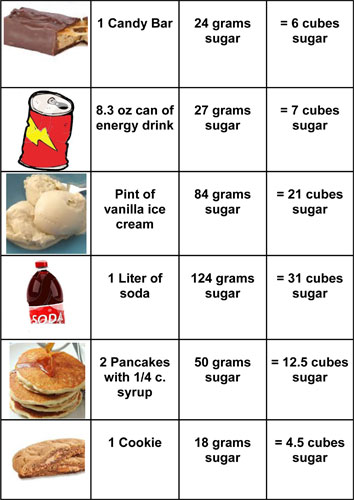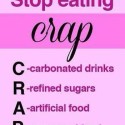Sugar as a Drug: Of all possible dietary culprits, sugar, especially processed fructose, wins top billing as the “greatest destroyer of health.” [i] Research shows that sugar consumption has increased annually since 1982. In 2000, each American consumed an average of 152 pounds of sugar. That’s 2/5ths of a pound — or 52 teaspoons — of added sugars per person per day.[ii] Sources of this sugar commonly include cane sugar, beet sugar, corn syrup and corn sugar. The American Heart Association recommends no more than 11 cubes of sugar (or roughly 100 calories) for women and 16.5 cubes (or roughly 150 calories) for men. At present, the USDA has no limit on the amount of sugar that can be served in school meals.
[i] Research shows that sugar consumption has increased annually since 1982. In 2000, each American consumed an average of 152 pounds of sugar. That’s 2/5ths of a pound — or 52 teaspoons — of added sugars per person per day.[ii] Sources of this sugar commonly include cane sugar, beet sugar, corn syrup and corn sugar. The American Heart Association recommends no more than 11 cubes of sugar (or roughly 100 calories) for women and 16.5 cubes (or roughly 150 calories) for men. At present, the USDA has no limit on the amount of sugar that can be served in school meals.
How Much Sugar Are You Consuming?
 A high level of sugar consumption has clear health consequences. One recent study, looking at the relationships between added sugar and heart disease found that:
A high level of sugar consumption has clear health consequences. One recent study, looking at the relationships between added sugar and heart disease found that:
- Most adults (just over 71%) get 10% or more of their daily calories from added sugar.
- Approximately 10% of American adults got 25% or more of their daily calories from added sugar in 2005-2010.
- The most common sources of added sugar are sugar-sweetened beverages, grain-based desserts, fruit drinks, dairy desserts, and candy.
- Those who consume 21% or more of their daily calories in the form of sugar are twice as likely to die from heart disease as compared to those who get 7% or less of their daily calories from added sugar.[i]
Sugar-sweetened beverages dramatically increase your risk of metabolic syndrome, type 2 diabetes, heart disease and mortality.[ii] One study showed that it only took two weeks for subjects consuming high-fructose corn syrup to have increased blood levels of LDL cholesterol and other risk factors for cardiovascular disease.[iii] Diet sodas or artificially sweetened foods and beverages are no better, as research reveals that they appear to do even more harm than refined sugar or high fructose corn syrup, causing even greater weight gain.[iv]
Sugar has also been shown to induce cancer. When we eat or drink sugar, it causes a spike in the hormone insulin, which can serve as a catalyst to fuel certain types of cancers, including breast and colon. Tumors with insulin receptors can be stimulated by a high intake of glucose from the blood stream…the sugar actually “feeds” the cancer growth.[v]
Sugar is addictive, activating the brain similar to drugs like cocaine. Dopamine, a chemical to stimulate the brain’s pleasure center, is released with the intake of sugar, just as it would with drugs or alcohol. People who frequently consume sweetened food and beverages may build up a tolerance, much like drug users do. The more you eat…the less you feel the reward. The result: you eat more and more to achieve the same feeling.[vi]
Finally, and of critical importance, sugar causes you to be unable to think clearly due to impaired brain cell signaling (decreased sensitivity due to chronic high blood glucose levels). Understanding sugar’s link to diseases and its effect on the brain, there should be an absolute limit, combined limit, of how much sugar kids consume across all school environments (cafeteria, snack bars, vending machines, classroom incentives and parties, etc.). Parents, knowing these limits, would have a better ability to monitor and limit further sugar intake beyond school hours in order to protect their child’s health.
[i] http://archinte.jamanetwork.com/article.aspx?articleid=1819573; March 11, 2014.
[ii] Effects of soft drink consumption on nutrition and health: a systematic review and meta-analysis. http://geti.in/17ErkaX; March 11, 2014.
[iii] http://articles.mercola.com/sites/articles/archive/2013/07/24/diet-soda-dangers.aspx; March 11, 2014.
[iv] http://articles.mercola.com/sites/articles/archive/2013/07/24/diet-soda-dangers.aspx; March 11, 2014.
[v] http://archive.sciencewatch.com/inter/aut/2010/10-nov/10novCant/; March 11, 2014.
[vi] http://www.foodaddictionsummit.org/docs/SticeSpoor2008.pdf; March 11, 2014.
[ii] http://www.usda.gov/factbook/chapter2.pdf; March 11, 2014.





